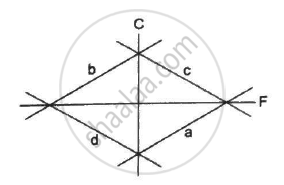Advertisements
Advertisements
Question
The susceptibility of magnesium at 300K is 1.2 x 10-5. At what temperature will the susceptibility increase to 1.8 X 10-5?
Solution
Given: `chi_1` = 1.2 x 10-5, T1 = 300 K,
`chi_2` = 1.8 x 10-5
To find: Required temperature (T2)
Formula: χT = constant
Calculation: From formula
`chi_1T_1 =chi_2T_2`
`:. T_2 = (chi_1T_1)/chi_2 = (1.2 xx 10^(-5) xx 300)/(1.8 xx 10^(-5))`
∴ T2 = 200 K
The required temperature is 200 K.
APPEARS IN
RELATED QUESTIONS
A metal sphere cools at the rate of 4°C / min. when its temperature is 50°C. Find its rate of cooling at 45°C if the temperature of surroundings is 25°C.
Two copper spheres of radii 6 cm and 12 cm respectively are suspended in an evacuated enclosure. Each of them are at a temperature 15°C above the surroundings. The ratio of their rate of loss of heat is.................
- 2:1
- 1:4
- 1:8
- 8:1
The dimensions of emissive power are
A pinhole is made in a hollow sphere of radius 5 cm whose inner wall is at temperature 727oC. Find the power radiated per unit area. [Stefan’s constant σ = 5.7 x 10-8 J/m2 s K4 , emissivity (e) = 0.2]
Compute the temperature at which the r.m.s. speed of nitrogen molecules is 832 m/s. [Universal gas constant, R = 8320 J/k mole K, molecular weight of nitrogen = 28.]
The light from the Sun is found to have a maximum intensity near the wavelength of 470 nm. Assuming the surface of the Sun as a black body, the temperature of the Sun is _____________.
[Wien's constant b = 2 .898 x l0- 3mK]
A metal ball cools from 64 °C to 50 °C in 10 minutes and to 42 °C in next 10 minutes. The ratio of rates of fall of temperature during the two intervals is _______.
What is the temperature of the triple-point of water on an absolute scale whose unit interval size is equal to that of the Fahrenheit scale?
1000 tiny mercury droplets coalesce to form a bigger drop. In this process, temperature of the drop _______ .
(A) increases
(B) may increase or decrease
(C) decreases
(D) does not change
Does the temperature of a body depend on the frame from which it is observed?
It is said that mercury is used in defining the temperature scale because it expands uniformly with temperature. If the temperature scale is not yet defined, is it logical to say that a substance expands uniformly with temperature?
Which of the curves in the following figure represents the relation between Celsius and Fahrenheit temperatures?

A spinning wheel is brought in contact with an identical wheel spinning at identical speed. The wheels slow down under the action of friction. Which of the following energies of the first wheel decreases?
(a) Kinetic
(b) Total
(c) Mechanical
(d) Internal
Is heat a conserved quantity?
A spinning wheel A is brought in contact with another wheel B, initially at rest. Because of the friction at contact, the second wheel also starts spinning. Which of the following energies of the wheel B increases?
(a) Kinetic
(b) Total
(c) Mechanical
(d) Internal
When a solid melts or a liquid boils, the temperature does not increase even when heat is supplied. Where does the energy go?
Should a thermometer bulb have large heat capacity or small heat capacity?
When a hot liquid is mixed with a cold liquid, the temperature of the mixture ____________ .
The mechanical equivalent of heat ____________ .
A circular hole of diameter 2.00 cm is made in an aluminium plate at 0°C. What will be the diameter at 100°C? α for aluminium = 2.3 × 10–5 °C–1.
The volume of a glass vessel is 1000 cc at 20°C. What volume of mercury should be poured into it at this temperature so that the volume of the remaining space does not change with temperature? Coefficients of cubical expansion of mercury and glass are 1.8 × 10–6 °C–1 and 9.0 × 10–6 °C–1 , respectively.
In hot summer after a bath, the body’s __________.
‘An object contains more heat’- is it a right statement? If not why?
Two objects are said to be in thermal contact if they can exchange heat energy.
One day in 1922, the air temperature was measured at 59°C in the shade in Libya ______.
The temperature of a liquid drops from 365 K to 361 K in 2 min. Find the time during which the temperature of the liquid drops from 344 K to 342 K.
(Take, room temperature = 293 K)
